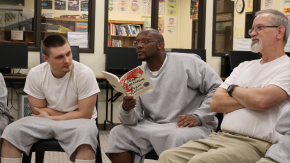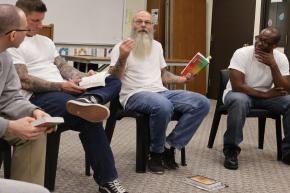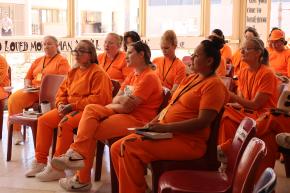
The winner of the Inside Literary Prize—the first major U.S. book award judged by people who are currently incarcerated—will be announced on August 1.
After months of reading and deliberation, more than 200 people incarcerated across multiple prisons will choose one book to be named winner of the inaugural Inside Literary Prize. It’s the first major U.S. book award to be decided exclusively by people who are currently incarcerated.

Inside Literary Prize judges leading a book discussion in North Dakota State Penitentiary.
The award—which we’re supporting alongside Freedom Reads, the National Book Foundation, and literary podcaster and bookstore co-owner Lori Feathers—increases access to literature in prisons and jails by bringing critically acclaimed books to people behind bars. But it also goes a step further, offering people who are incarcerated a platform to make their voices heard within the broader cultural discourse.
“I love reading and have many opinions about books,” writes Heather, one of the judges of the award, who is currently serving time in the Minnesota Correctional Facility in Shakopee. “This gave me the opportunity to have an official opinion and voice that is actually taken seriously. I felt my opinion was valued and important.”
Along with hundreds of other incarcerated judges, Heather read four books that were nominated for the 2022 National Book Awards: Tess Gunty’s “The Rabbit Hutch,” Jamil Jan Kochai’s “The Haunting of Hajji Hotak and Other Stories,” Imani Perry’s “South to America: A Journey Below the Mason-Dixon to Understand the Soul of a Nation,” and Roger Reeves’ “Best Barbarian.” Then, after months of discussion with her peers, she cast her vote for a winner. The winning book will be announced on August 1.
“Reading has provided an escape when needed and entertained me beyond belief in this hard environment,” writes Timothy from the Nash Correctional Institution in North Carolina, echoing a feeling expressed by many of his peers and fellow jurors on the Inside Literary Prize. “More importantly, reading has equipped and empowered me.”

Judges meet with the Freedom Reads team in Arizona's state prison in Perryville.
For others, like Shacoia, participating in a collective process of decision-making was a valuable experience in its own right. “Thank you for taking the time out to reach those of us who are incarcerated and who feel forgotten at times to do and participate in something bigger than ourselves,” she writes in a letter to our partners at Freedom Reads.
Mass incarceration alienates those of us on the outside from the humanity of those who have been incarcerated. The Inside Literary Prize challenges that alienation at its core. It tears down walls in our cultural discourse by bringing people who are incarcerated into a national conversation about literature and the human condition. And it gives our neighbors in prisons and jails an outlet to exercise the voices and inherent dignity they have had all along.
All photos courtesy of Freedom Reads.

